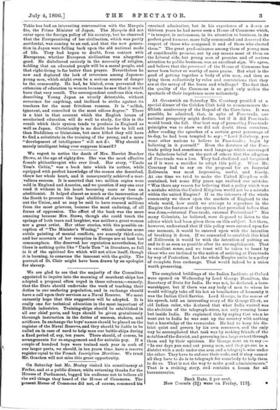We regret to notice the death of Mrs. Harriet Beecher
Stowe, at the age of eighty-five. She was the most effective female philanthropist who ever lived. Her story, "Uncle Tom's Cabin," was a book into which its author, while equipped with perfect knowledge of the scenes she described, threw her whole heart, and it consequently achieved a mar- , vellous success. It is asserted that two million copies were sold in England and America, and we question if any one ever read it without in his heart becoming more or less an abolitionist. It helped almost as much as the insurrection of the South to procure the legal abolition of slavery through- out the Union, and so may be said to have rescued millions from the most grievous, because the most enduring, of all forms of oppression. The effect of the book was the more amazing because Mrs. Stowe, though she could touch the springs of both tears and laughter, was neither a great woman -nor a great artist. Her other stories, with the possible ex- ception of "The Minister's Wooing," which contains some subtle painting of mental conflicts, are scarcely third-rate, and her accounts of her reception in Europe are at best but commonplace. She deserved her reputation nevertheless, for there is nothing quite like "'Uncle Tom" in literature, so full is it of the spiritual fire which will not allow itself, though it is burning, to consume the innocent with the guilty. The portrait of St. Clair might have been drawn by an apologist for slavery.










































 Previous page
Previous page